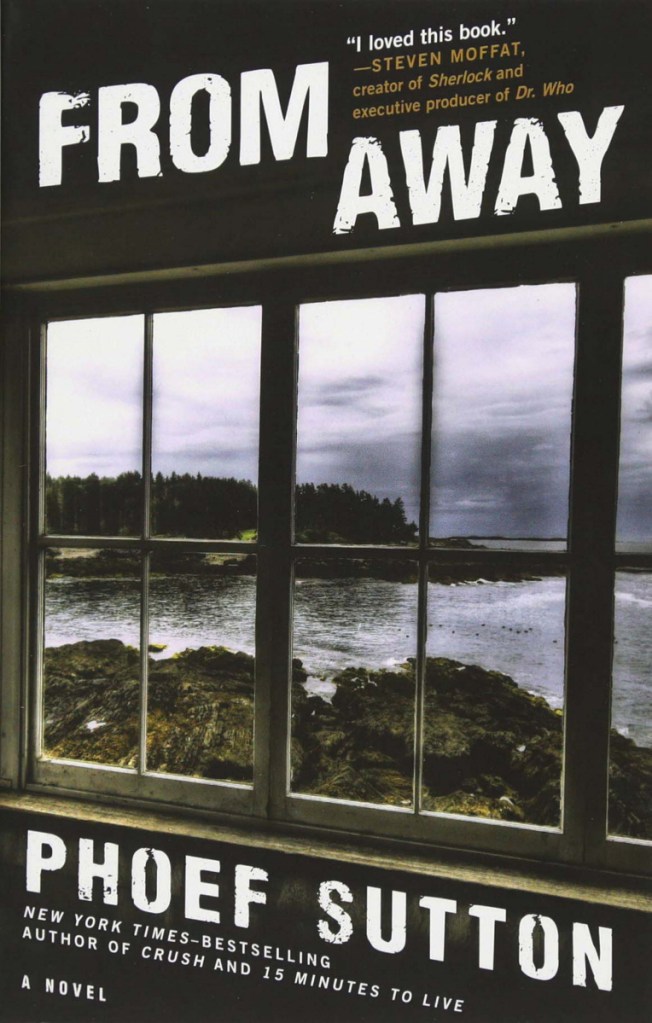According to North Haven’s website, the Maine island has been inhabited for millennia – the Red Paint People and the Pre-Algonkians were there as early as 3300 B.C. – but “the credit for ‘discovering’ it traditionally goes to Martin Pring who, in 1603, gave the name ‘Fox Islands’ to the islands now known as Vinalhaven and North Haven.” In a hat tip to Maine history, Phoef Sutton’s latest novel, “From Away,” features a fictional Fox Island as the setting for much of its drama.
Although it’s a bit of a slow start, by about 70 pages in, narrator Sammy Kehoe, his sister Charlotte, and her 4-year-old daughter Maggie, are finally taking the ferry off the mainland. The setup is necessary, though – in the opening pages, we learn that Sam is writing down his memories of the last couple of weeks for Maggie, who is lying unconscious in a hospital. “I have to believe you’ll have a twenty-first birthday,” he writes. “I have to believe you’ll grow up tall and straight and strong and beautiful, even though believing doesn’t come naturally to me.” These ominous words help build the tense questions the novel is based on – what happened to Maggie, and will she be okay?
Sam is no ordinary man. He can see ghosts – or, as he prefers to call them, spooks. But he’s spent his lifetime trying to deny it, to ignore them when they show up, and now, at almost 30, he rarely sees anything that isn’t there. When his girlfriend Anne breaks up with him, though, Sam’s vulnerable state allows him to see his first ghost in five years, the first since his parents and older brother died in a car accident. Spooked by the spook, Sam convinces Charlotte, the only family he has left in the world, to head to their family’s old safe haven, Fox Island, where they used to spend their summers.
The island feels charmingly real, and Sam clearly loves it there. Even though he’s “from away,” meaning he’s not a local, Sam is accepted as a familiar face among many. Small-town charm is often conveyed in literature as idyllic, somehow pure, but Sutton doesn’t go the whitewashing route. He makes it clear that there are plenty of single mothers, drunks, abusive husbands and AA attendees living on Fox Island. Even though people don’t lock their doors and never call before they come over, it’s still a place where humans live, along with all their troubles.
Sam doesn’t expect to run into trouble there, but of course, he absolutely does. After meeting a recent island transplant named Kathleen, he begins to see Jellica, the little girl who’s haunting her. When Kathleen catches wind of this, she’s furious – Jellica is a painful reminder of her past as a New York City cop, a memory that haunts her because it’s so terrible. But she knows there’s no way Sam could be connected to this chapter of her life, so she gives him the benefit of the doubt and tries to help him figure out whether his gift is real.
It’s real, all right, and worse than that, Maggie has it too; she sees Jellica as well as a whole host of other spooks. She seems to deal with it better than Sam does, but he’s trying. He visits a local medium named Emily Day and attempts to connect with his abilities, while meanwhile urging his sister Charlotte and his island friend Neil to get together. The results of both attempts are somewhat disastrous, but it would be spoiling the best parts of the book to comment further.
What’s lovely about “From Away” is its ability to be unassuming. Sam is a skeptic, and he doesn’t exactly love having this gift of sight. He’s just a screw-up without a plan, trying to make his sister and niece feel safe and loved, even as he craves the reassurance for himself. His narration is full of self-deprecating humor without being overly self-conscious, and he’s able to surprise with occasional nuggets of wisdom: “When we mourn for a pet we mourn for more than just the animal itself; we mourn for the time it marked in our lives, the time that will never be regained.”
While Sam’s spooks are very real in the novel, they also serve as a broader metaphor that explores the complexities of grief: how isolating it can be, how destabilizing it is and how connection and love help us to live through it.
Ilana Masad is a book critic and fiction writer starting her Ph.D. at the University of Nebraska-Lincoln. Her work has appeared in The New Yorker, StoryQuarterly, Broadly, the Washington Post, the L.A. Times and more.
Send questions/comments to the editors.



Comments are no longer available on this story